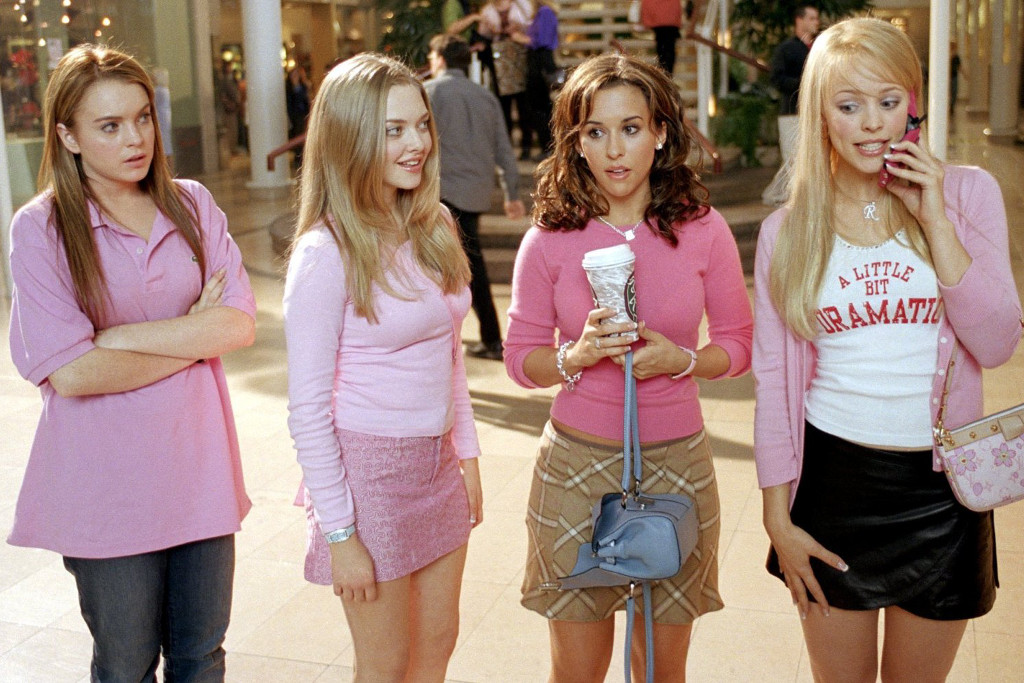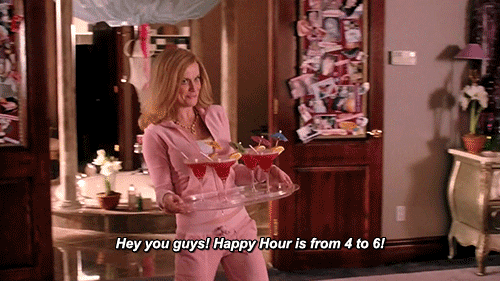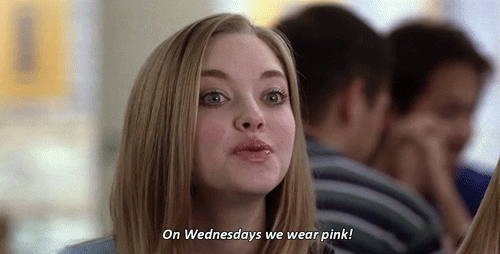Revisited: Ten Years On, Mean Girls Is As Fetch As Ever
Ten for you, Mean Girls! You go, Mean Girls! (Also includes details of our next Junkee Movie Night in Sydney, featuring Ben Jenkins, Genevieve Fricker and Patrick Lenton.)

Like every other member of Generation Y, I love Mean Girls. The film, originally released on April 30, 2004, shaped so much of my adolescence. Back in the days (I’d rather forget) of orthodontic, emotional and growing pains, the film was two very different things to me: a reflection of my life, and a fantasy I wished would happen. Directed by Mark Waters, with an excellent screenplay by Tina Fey, Mean Girls was somehow able to show teenage life as it is, but also portray an alternative to it — one in which we all get along and eat cake filled with rainbows and smiles.
Cady Heron (Lindsay Lohan, before it all went horribly wrong) is as out of place as any teen protagonist, yet she isn’t resentful, or even aware of it. After being home-schooled for sixteen years, she enters North Shore High and “gets socialised” among different types of people in the student body, including Queen Bee Regina George (Rachel McAdams) and her gang of ‘Plastics’, while trying to mediate a sense of belonging with a sense of self.
The film, which focuses on high school and the bitchiness that comes with being a teenage girl, was by no means a pioneer. Films like Heathers (1988) and Clueless (1995) already dealt with school cliques and the quest for popularity. At the time of its release, Rolling Stone critic Peter Travers even specifically described Mean Girls as “a satire of high school bitchery that plays like Clueless meets Heathers”, so there you go.
But Mean Girls is more self-aware and more insightful than those films. Instead of simply killing off the popular girls à la Heathers, it forces them to talk about their issues until they become ‘actual human beings’. Rather than focusing on a flighty heroine like Cher from Clueless, whose behaviour is reflected in the film’s title, Cady is complicated. As an outsider, she’s alien to school clique politics, likening the students to animals. But as she becomes inducted into school life, she encounters a gradual transformation that she doesn’t completely understand: “The weird thing about hanging out with Regina was that I could hate her, and at the same time, I still wanted her to like me.” The film offers a more pragmatic (and certainly less horrific) approach than its older sisters, striking a perfect balance between dark comedy and chick flick.
And I’d be like, “Why are you so obsessed with me?”
My sister and I used to watch Mean Girls every day when we came home from school. The 93-minute film was the perfect thing to tune into before our parents came home, and we pretended we’d been doing homework the whole time. It was our happy hour, from 4 to 6.
It doesn’t seem like a whole decade since I was sitting on a couch in my school uniform, clutching a bowl of popcorn and watching Janis (Lizzy Caplan) and Damian (Daniel Franzese) flinch at Cady’s actually scary Halloween outfit. I’ve watched it with subtitles, and with the director’s commentary on. I’ve watched all the deleted scenes. I’ve watched the bloopers. I’ve watched every featurette and interstitial on the ‘Special Collector’s Edition’ DVD. Multiple times. I’m surprised the disc didn’t catch fire from spinning around in our DVD player so much in those obsessive high school years. And still, every time I re-watch it, I find new things to analyse:
- Did Janis see Cady as an opportunity to get revenge on Regina? Or did she genuinely like her?
- Regina was totally going to set Cady up with Aaron, right? Watch the change in Regina’s behaviour when Aaron says, “I invited her tonight…” (1:47):
- Who exactly were those three other candy canes for?
- What is in a Kalteen Bar, anyway?
- What are Damian and Janis doing when Cady is nominated for queen?
Really, if you’ve got the answers to any of these, please let me know. I’m assuming at least some of you overthink this film as much as me.
Like leaving the actual world and entering Girl World
The thing that charmed me most about Mean Girls — and what kept me watching every afternoon for almost a year — was that even when things were terrible at school in real life, I could believe that one day the end of the film would come true, and I’d get the chance to say, “Finally, Girl World was at peace.” Obviously, that was never going to happen — high school is brutal for everyone (hormones, mergh) — but the escapism was good enough for me. Unlike a young adult fiction book in which some nerdy girl simply complained about not being part of the ‘cool’ group, Mean Girls actually took us right into Girl World.
So much of it remains relatable: Cady’s strange combination of intimidation, admiration and fear of Regina; the link between popularity and fame; and attitudes towards going beyond the bare minimum in class:
But at the same time, so much of the film is also like listening in on a conversation you’re not supposed to. We get an insight into life at various rungs on the social ladder, and when Cady says during the final confrontation, “It seemed like every clique had its own problems…”, we understand that bitchiness and fighting, however awful, are what likens us to each other.
The limit does not exist!
There’s no limit to the number of Mean Girls references one could use in daily situations.
When we did limits in Maths class, all anyone could say was, “The limit does not exist!” (which turned out to be kind of anticlimactic, because limits don’t exist half the time). Everyone’s excuse for getting out of something they didn’t want to do was a fake cough and an “I can’t. I’m sick.” We yelled out “She doesn’t even go here!” to people just because they wandered into our homeroom. Plus, Sex Ed was even funnier because we could quote Coach Carr (Dwayne Hill):
But while we’ve all happily regurgitated Mean Girls’ dialogue for the past decade, its influence goes beyond the quotable script.
Mr Duvall, can you wrap it up?
A Mean Girls made today — should we dare to think about it — would likely focus more on Cady’s struggle with technology. Maybe she’d tweet #using #hashtags #for #every #word, or she’d be like parents who have Facebook and comment on everything with an essay. Aaron Samuels (Jonathan Bennett) would wear skinny jeans. Janis’s revenge could potentially be carried out on the internet. And instead of using candy canes to impersonate Regina’s affection, they might hack her Facebook account. It’s too much of a mind-fuck to comprehend.
Despite all that, we aren’t ready to put Mean Girls in the history books yet. It’s still relevant. Schools are encouraged to watch it to discuss youth issues such as body image; there are academic research papers and books on it; Mariah Carey even referenced it in a song (okay, that last one wasn’t exactly highbrow, but still). Regina George is still as intimidating as she was when she first told Cady to “Seriously, sit down!” in the cafeteria, and viewers still dream of the day when their own Girl World will be at peace.
Conveniently, today’s a Wednesday, so I’ll be wearing pink.
–
Michelle See-Tho is editor of Farrago, and a freelance writer and journalist. Her work has appeared in The Conversation, Kill Your Darlings, and Crikey. Follow her on Twitter at @stmischa
–
EVENT ANNOUNCEMENT: JUNKEE MOVIE NIGHT #2
If you’re in Sydney, Junkee is hosting its next Movie Night on Wednesday May 14 at Golden Age Cinema & Bar.
Three Junkee writers — Ben Jenkins, Genevieve Fricker and Patrick Lenton — will be reading from the never-before-seen Junkee Burn Book: where we write mean things about people who suck. This will be followed by a screening of Mean Girls, and then drinks in the Golden Age Bar. It’s being held on a Wednesday for a reason, people.
Bar opens at 5pm; talks and film start at 7pm. Tickets $20, or $15 for concessions and FBi subscribers — book here.


